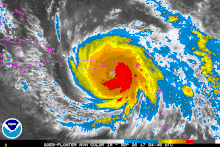
Hurricane Maria struck Puerto Rico as a high-end Category 4 hurricane on September 20, 2017, resulting in the island's most severe natural disaster in modern history.[1] The entire island suffered devastating effects with the entire population losing access to electricity, the majority losing access to clean water, tens of thousands of homes destroyed, and road infrastructure left crippled. A series of cascading infrastructure failures compounded the direct effects of the hurricane. Lack of aid, electricity, water, and access to medical care endangered many people; elderly and poor residents were most impacted.
Despite the severity of these impacts, the Government of Puerto Rico initially reported that only 64 people died in the hurricane. Numerous media outlets harshly criticized the government for suppressing the true death toll. Investigative reporting corroborated these accusations, with The New York Times finding upwards of 1,000 potentially hurricane-related fatalities in the months following Maria. In response to mounting accusations of a cover-up, the government ordered an independent investigation and on December 18, 2017 contracted a study of the death toll by the Milken Institute School of Public Health.[2]
In February 2018, CNN and Puerto Rico's Center for Investigative Journalism filed three lawsuits against the Government of Puerto Rico to obtain details on deaths in the months following Maria. Following a court ruling, the government released the withheld information. Statistical data showed an increase of 1,427 deaths in 2017 as compared to the preceding four years; however, the number attributable to Maria could not be determined. On August 28, the Government of Puerto Rico revised the official death toll to be 2,975 people, ranking Maria as one of the deadliest hurricanes in United States history. The official estimate is based on a study commissioned by the governor of Puerto Rico,[3] where researchers at George Washington University developed statistical models showing the number of excess deaths for the time period between September 2017 and February 2018 to be between 2,658 and 3,290 (with a 95 percent confidence interval).[4] Researchers attributed the low initially reported death count to "lack of awareness of appropriate death certification practices after a natural disaster" among physicians reporting deaths to vital statistic agencies.[4]
- ^ John D. Sutter, Cristian Arroyo, Madeleine Stix, Aaron Kessler, and Michael Nedelman (September 17, 2018). "'The Maria Generation': Young people are dying and suffering on an island with a highly uncertain future". CNN. Retrieved September 17, 2018.
{{cite news}}: CS1 maint: multiple names: authors list (link) - ^ "White House defends Trump's false claims about Hurricane Maria's aftermath in Puerto Rico". PBS NewsHour. September 14, 2018.
- ^ Baldwin, Sarah Lynch; Begnaud, David (August 28, 2018). "Hurricane Maria caused an estimated 2,975 deaths in Puerto Rico, new study finds". CBS News. Retrieved August 28, 2018.
- ^ a b Cite error: The named reference
GWUstudywas invoked but never defined (see the help page).